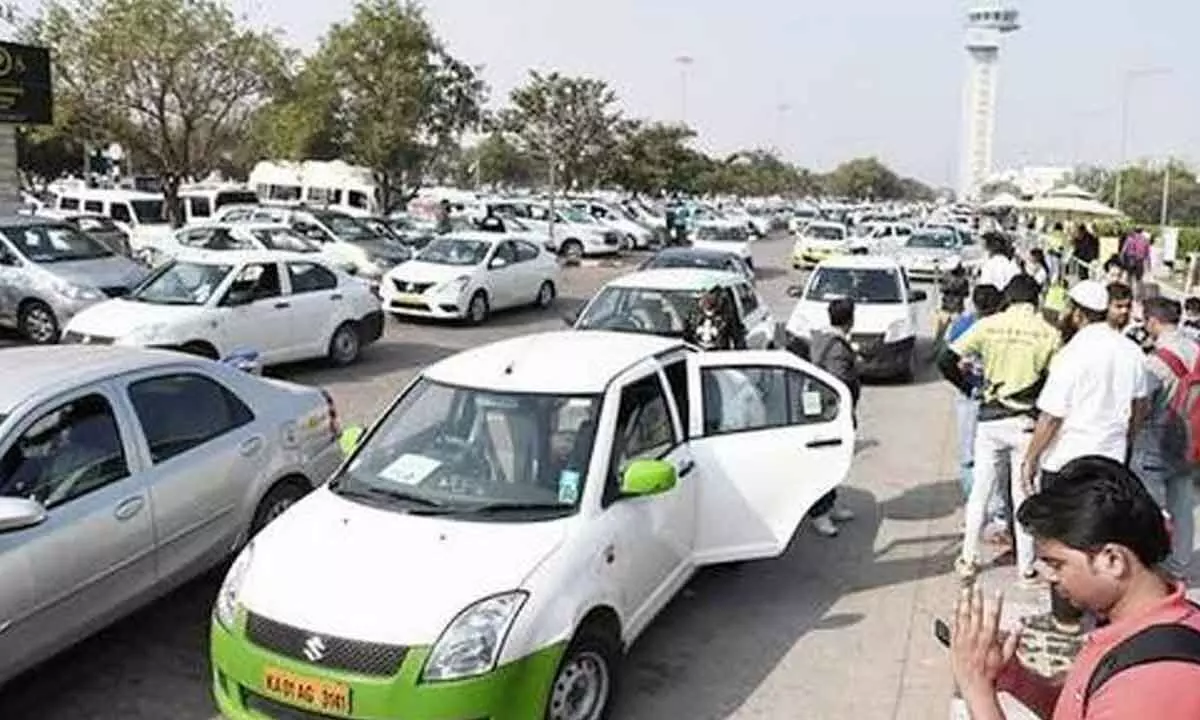Live
- Bengal: Senior resident doctor accused of rape, attempt to murder absconding
- Prateeksha Srivastava says she seldom meets fellow music composers Rusha, Blizza, in person
- KTR Accuses Government of Brutality Against Farmers, Calls for Immediate Action
- Manchu Manoj Attends Shooting Amid Family Controversy
- BWF World Tour Finals: Treesa-Gayatri defeat Malaysian pair to keep semis hopes alive
- MUDA case: Complainant Krishna asks Lokayukta to file new plaint on CM Siddaramaiah on ED’s report
- Airport capex in India to cross Rs 60,000 cr in fiscals 2025-2027 to handle growing traffic: Crisil
- Five-Year-Old Boy Dies After 55-Hour Rescue from Borewell in Rajasthan's Dausa
- Chaos in Parliament over Congress-George Soros link claims, BJP MP poses questions
- Bus Driver Arrested After Deadly Accident in Mumbai’s Kurla; 42 Injured
Just In
Cab drivers in Hyd’bad earn low, bereft of social benefits: Study


Average Monthly Earnings: Rs. 45,000 - Rs. 50,000
Health Impact
• Most common health impact: Chronic bodily stress leading to pain.
• 50% of respondents experienced chronic back, leg, and joint pain.
• One driver spent Rs. 35,000 on treatment for acute back pain.
• Another driver spent Rs. 1500-2000/month for two years on back pain treatment.
Net Income after All Operational and Capital Costs
• Gross Earnings: Rs. 50,000
• EMI Deductions: Rs. 13,000
• Additional Costs: Rs. 1,000
• Net Income: Around Rs. 10,000 (Approximately 20% of total earnings)
Commission Rates
• Uber: Worst (highest commission)
• Ola: Slightly better (between one-third and one-fourth of earnings)
Expenses
• Fuel Cost: 40% of earnings (Single largest cost element)
• Maintenance Cost: Over 10% of earnings (Taxis run 250-300 kms daily)
Hyderabad: According to a recent research conducted by the Centre for Labour Studies at NLSIU, Bengaluru, and the Montfort Social Institute, Hyderabad, it was discovered that drivers receive an average monthly income ranging from Rs. 45,000 to Rs. 50,000, after accounting for the commissions paid to the taxi platforms.
Numerous taxi drivers had explored alternative job opportunities, such as starting their own taxi business or seeking employment in different industries, including corporate positions and educational institutions. However, the appeal of joining taxi platforms like Uber and Ola grew significantly due to the promising earning potential advertised by these platforms.
For many drivers, driving for these companies became their primary source of income, demanding long hours that left no time for pursuing other employment opportunities.
Speaking to The Hans India, Babu Mathew, Professor, Centre for Labour Studies, NLSIU Bangalore, said, “In a previous study focused on food delivery workers in Bengaluru city, we observed similar findings regarding the financial situation of cab drivers in Hyderabad. Our research indicated that these drivers experience low pay and, in addition, lack access to essential social benefits in the event of adverse circumstances. It is concerning that they are not covered by existing labour laws in India, which leaves them vulnerable and unprotected.”
To improve their situation, cab drivers urgently require access to accidental, health, and other insurance policies. A significant portion of their income is allocated to vehicle maintenance since they typically use their own vehicles for work. Implementing legislation that offers specific benefits for these drivers is crucial to alleviate their hardships and provide them with the support they deserve. By addressing these issues through legal backing, we can help improve the overall working conditions and welfare of cab drivers in Hyderabad, he added. The study closely monitored the daily earnings of workers, and on average, they earned around Rs. 45,000 to Rs. 50,000 per month after accounting for the commissions paid to the platform. However, the workers reported that Uber, a multinational company, imposed the highest commission rate, while Ola’s commission rate was only slightly more favourable, taking between a third and a fourth of the earnings from customers. Despite seemingly decent monthly wages, the workers faced considerable challenges due to the deductions required to cover taxi operating expenses. Fuel costs alone accounted for a significant portion, consuming 40 percent of their earnings, making it the largest cost element. Considering the extensive daily usage of taxis, averaging 250-300 kilometres each day, and nearly every day throughout the month, maintenance costs were also high, with more than 10 percent of their earnings allocated to taxi maintenance.
Varghese Theckanath, director of Montfort said, “The platform work is increasingly becoming the new face of work. Our governments seem to be reluctant to regulate platform work because they do not want to displease the investors in the sector.”
Our study shows that such lethargy from the State is at the cost of the well-being of large number of workers. It is necessary that governments at the Centre and States take responsibility for the rights and well being of the dynamic sector of workers through regulatory measures, he added.
The study revealed alarming health impacts on the taxi drivers, with the most prevalent issue being bodily stress leading to chronic pain. A striking 50 percent of the respondents in the study reported experiencing chronic back, leg, and joint pain. One respondent even suffered from acute back pain persisting for two months, reaching a point where he was unable to get out of bed. The severity of the pain forced him to spend Rs. 35,000 on treatment for his health condition. The doctor recommended regular physiotherapy, but due to the high cost of Rs. 1000 per session, the driver could not afford it. As a result, he had to endure the pain and continue working despite its detrimental effects on his health. Another worker had been seeking treatment for back pain for two years and spent an average of Rs. 1500 to Rs. 2000 each month on medical expenses. This demonstrates the chronic nature of the health issues faced by taxi drivers and the financial burden they endure while trying to manage their health conditions.

© 2024 Hyderabad Media House Limited/The Hans India. All rights reserved. Powered by hocalwire.com






